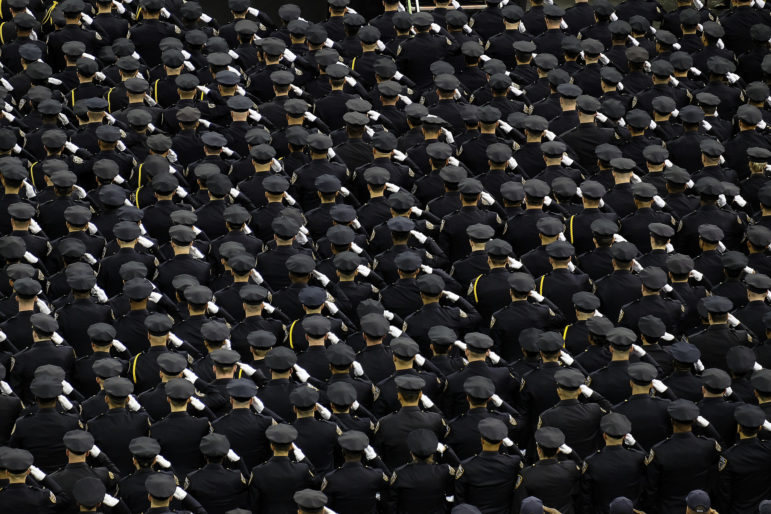
Diana Robinson/Mayoral Photography Office
As native New Yorker, I have been living in public housing my entire life. It is where I was raised, where I played, and where my mother saw me go off to school. It was also where I had my first police encounter.
When I was 15 years old, I was stopped by a police officer on my way home from Jane Addams High School. I was about a block away from my complex. The officer grabbed my bookbag, ripped it open (breaking the zipper), and rummaged through my notebooks and schoolwork, only to give it back and walk away without saying a word. Feeling violated, I cried the rest of the way home because I felt helpless.
One rough encounter with the police is enough to shake a person to her core, and it did. I told my mother, but she thought it was best to do nothing. My father felt the same way, based on his own negative experiences with the police — he himself had been stopped and frisked in the area for no good reason before. So I took what I thought was solid advice and stayed silent. But by saying nothing, I had changed nothing.
Months later, I was waiting for a classmate in the lobby of my aunt’s public housing complex, which I visited every day, when an officer and his supervisor barged in and began to search the premises. But I paid no attention to them. I went to look out the door because I got a text saying my friend was coming down the block — and then held the door for the officers as they were walking out.
But then things got confrontational: They asked me what I was doing there. When I said I was waiting for a friend, one of them started screaming, “So you’re trespassing!” I told them my aunt lived there, but I got scared and didn’t say anything else — I was only a teenager. So I decided to go back upstairs. But before I could even press the elevator button, the officer ordered me to come back. His supervisor grabbed me by my jacket and slammed me against the wall. They ignored my cousin when she came down and told them, again, that my aunt lived there. Instead, they arrested me for trespassing and called me a racial slur.
The charge was later dismissed, but the pain and indignity of being treated like a criminal has stayed with me. My everyday behavior — walking home from school, visiting my aunt, waiting on a friend in a lobby — had become criminal.
This time, however, I didn’t keep it to myself. This time, I fought back. With the help of the NAACP Legal Defense Fund and the Legal Aid Society, I joined other plaintiffs to file a lawsuit against the city and the New York City Housing Authority (NYCHA). This lawsuit, Davis v. City of New York, tried to put an end to the police harassment of public housing residents and their visitors, who are targeted for no other reason than being black or brown on public housing grounds.
Four years later, I felt vindicated when the city acknowledged in our case that “NYCHA residents and their authorized visitors have the same legal rights as the residents and authorized visitors of any other residential building in New York City,” and that we “deserve the utmost courtesy and respect.” In another case, Floyd v. City of New York, a court found that the NYPD illegally and systematically stopped and frisked thousands of New Yorkers based on their race. That validated my experiences and many others who had negative, unjustified, and often traumatic run-ins with the police.
In Floyd, the court said, “No amount of legal or policing expertise can replace a community’s understanding of the likely practical consequences of reforms in terms of both liberty and safety.” Thus, the court ordered a two-step process to develop reforms: one led by attorneys, and the other by community members most affected by the NYPD’s abuse.
To me, that meant that our voices finally mattered. At long last, I was excited that real change would be happening, and we’d be able to use our own experiences and expertise to contribute to that change. Thousands of New Yorkers were eager to participate in 64 focus groups and 28 community forums across the city.
A court-appointed facilitator recently released a report about this Joint Remedial Process and makes some important recommendations for reform. Some recommendations are what we need, but others don’t go far enough. But what’s really important right now is for the court to take action and force the NYPD to take the community’s demands seriously. We need to finally have a police department that works for us, not against us.
The NYPD cannot roll out fixes on its own. It must consider the views of the people on the receiving end of its abuse, the same people who are most likely to distrust police. And while the court mandated that the community play a central role in developing reforms, it must also order that these changes actually be implemented. We’ve done our part, but we still await true reform.
More than anything, I want the police to have compassion. To serve and protect us as they’re entrusted to do. And I want them to finally hear me—my stories and my solutions—and take them into account. For all we’ve endured, that’s not too much to ask.
Rikia Evans is a lifelong New York City resident and a named plaintiff in Davis v. City of New York.









One thought on “CityViews: Courts Have to Force More Change at the NYPD”
Change the people. If there was no crime there would be no police.its always train and change the police well how about the people